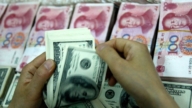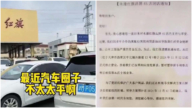【新唐人2012年6月21日讯】在墨西哥18号举行的二十国集团领导人第七次峰会上,中国承诺,向“国际货币基金组织”(IMF)出资430亿美元,不过专家指出,在中国百姓还承受高度通货膨胀,贫穷人口过亿的情况下,没有必要承诺拿出其他金砖国家4倍多的投资。
这次各国向“国际货币基金组织”增资共4560亿美元。中国承诺金额仅次于日本和德国,排名第三,占新兴经济体出资总额(900亿美元)的近50%。而和中国同属于“金砖五国”的印度、俄罗斯、巴西分别承诺注资100亿美元,南非20亿美元。
虽然央行官员表示,中国参与增资将相应增加在“国际货币基金组织”IMF的“话语权”。不过国内民众和媒体依然质疑,在中国的贫困人口上亿,贫富两极分化严重,通货膨胀严重的情况下,承诺增资这么多是否合理。
美国“南卡罗来纳大学艾肯商学院”教授谢田表示,中国作为G20的成员,向国际货币基金组织增资,帮助应对当前世界经济面临的风险和挑战是应该的, 但没有必要承诺拿出其他金砖国家4倍多的投资,因为中国能拿出的这部分外汇储备,实际上是有代价的。
谢田:“因为这些钱,作为外汇占款的一部分,实际上导致了中国巨大的通货膨胀。就是说,在中国老百姓还在承受高度的通货膨胀的时候,中国政府却拿出这么多钱,来援助其他国家,而那些国家实际上,比中国人民生活的要富裕幸福的多,这实际上是蛮不公平的。”
中国科学院2012年完成的《2012中国可持续发展战略报告》提出,按中国政府2011年底制定的收入“一天一美元”的最新贫困线,年收入在人民币2300元 (大约354美元) 以下的贫困人口大约有1.28亿,就是大约平均每11名中国人中,有1名贫困者。
但是谢田认为,这个数字并不准确。
谢田:“中国实际上几亿人在低于这个贫困线。中国科学院所谓的一美元贫困线以下的这个1.28亿,我觉得根本不止于此。巴西、俄罗斯、南非,这些国家的人均收入、人均农产值和GDP都远远高于中国,它们其实才更有力量拿出这些钱来。”
根据《美国之音》统计,中国仅六月已经宣布今年将无偿援助阿富汗1亿5000万元人民币;向上海合作组织其他成员国再贷款100亿美元;上个月则表示,将援助柬埔寨1.2亿元人民币,以及宣布向业门提供1亿元人民币无偿援助。
谢田指出,中共从70年代就资助扶植包括朝鲜在内的专制独裁国家,不是为了乐善好施,而是为了拉拢伙伴,在联合国取得更多影响,抗衡民主国家。
谢田:“看看最近中共这些年在联合国安理会的投票,你就知道它实际上一直是站在那种独裁、专制、落后和愚昧的国家,站在一起,实际上总是跟自由社会,正的力量是相对抗的。”
中国央行刚刚在6月7号令人意外的宣布了三年来首次降息,显示出中国的经济放缓速度超过预期。法国《世界报》引述专家的分析指称,中国经济增速放缓已经成为全球投资主要担忧的问题之一。
这次IMF增资,美国第一次没有参与,美国受到中共媒体的讥讽,不过“人民网”也承认,2009年IMF增资时,中共承诺认购500亿美元的IMF票据,截至目前仅购买了约57亿美元。这次中共仍将以购买IMF票据的形式,参与IMF增资,因此,430亿也只是个承诺的额度,中共能真正做到吗?
采访/刘惠 编辑/尚燕 后制/肖颜
Communist China Commits to IMF Pledge, Expert Worries about Inflation
In the 2012 Group of 20 Leaders Summit in Los Cabos, Mexico,
China pledges US$43 billion to the International Monetary Fund.
Expert comments that while the Chinese are suffering from high
inflation and over one hundred million of them are living in poverty,
China should not have promised more than 4 times the funds
agreed by other BRIC countries.
Nations from around the world pledge a total of
US$456 billion to the International Monetary Fund (IMF).
China’s pledge ranks third,
second only to Japan and Germany.
It accounts for nearly 50% of the total contribution
(US$90 billion) pledged by emerging markets,
while four other large emerging markets (BRICS countries)
such as India, Russia, and Brazil commit US$ 10 billion each, and South Africa US$2 billion.
The Chinese central bank official indicates China’s participation
in increasing the funds will gain greater voting power in the IMF.
However, it is also questionable whether this promise
is reasonable considering that
over one hundred million Chinese are suffering from poverty,
serious inequality, and high inflation through China.
Professor Xie Tian from University of South Carolina Aiken’s
School of Business comments that as a member of the G20,
China should contribute to IMF emergency funds to help
address the risks and challenges facing the world economy.
However, there is no need for China to commit more than
4 times the contribution from any of the BRICS countries.
It comes with a price, because a great deal by using that
much of foreign exchange reserves.
Xie Tian: “As part of the Foreign Exchange Reserves, in fact,
this amount could lead to huge inflation in China.
Particularly when the Chinese are still suffering
from a high degree of inflation,
the government is assisting other relatively richer countries
with such huge amounts is not fair to the people."
According to the “China Sustainable Development Report 2012″
by the Chinese Academy of Sciences,
with the latest poverty line defined at the end of 2011,
“one US dollar a day" or an annual income of less than 2300 yuan,
there are about 128 million Chinese living in poverty.
That means one in every 11 Chinese is poor.
Xie Tian does not believe the accuracy of the data.
Xie Tian: “There are in fact several hundred million people
below the poverty line.
I don’t believe the number 128 million Chinese in poverty
claimed by the Chinese Academy of Sciences.
Countries such as Brazil, Russia, and South Africa have much
higher per capita income, per capita agricultural output and GDP.
They are in fact more capable of contributing that money."
According to Voice of America reports, in June China has
pledged “selfless help" to Afghanistan with 150 million yuan,
and a sum of US$10 billion in loans to the other member
states of Shanghai Cooperation Organization.
Last month, China also announced to offer assistance of
120 million yuan to Cambodia, and provide Yemen with 100 million yuan in free aid.
Xie Tian pointed out that the Communist regime has started
the financial aid since the 1970s to foster dictatorial countries including the North Korea.
It has never been about charity, but to gain influence in
the United Nations by pulling in partners to contend with democratic countries.
Xie Tian: “Look at the votes the Communist China has done
in these years in the UN Security Council.
You’ll know the regime has always been for the countries of
dictatorship, tyranny, backwardness and ignorance.
They stand together, in fact, to confront the free and
righteous society."
China’s central bank has just announced an interest rate cut
on 7th June for the first time in three years.
It shows that the Chinese economy is going down
more than expected.
The French newspaper, Le Monde, reported that
according to expert’s analysis,
the slowdown of the Chinese economy has become
one of the main concerns of global investment.
For the very first time, the United States did not participate
in the IMF pledge and thus was criticized by the Communist state media.
However, the People.com also admitted that the Communist
regime committed US$50 billion to the IMF fund in 2009, but only contributed about US$5.7 billion.
This time the Communist regime continues to participate
in the IMF in the form of raising the emergency pledge,
the amount of 43 billion is again a number. The question is
will the Chinese Communists really commit to that.



























